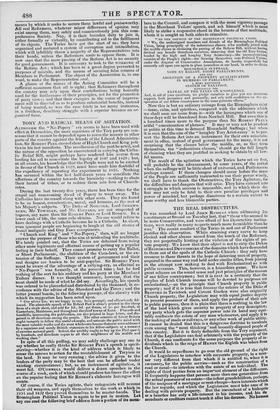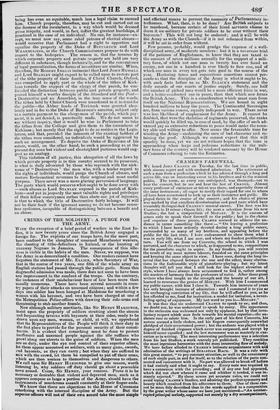THE REAL DESTRUCTIVES.
IT was remarked by Lord JOHN RUSSELL when addressing his constituents at Stroud on Tuesday last, that " those who seemed to be more Conservative, and were afraid of his Destructive inclina- tions, were really in many respects much more formidable titan he was." The recent conduct of the Tories in and out of Parliament justifies this observation. While straining every nerve to keep clerical and other abuses sacred from the touch of the Reformer, they are perpetually hinting at the violation of the rights of pri- vate property. We know that their object is not to strip the Dukes of BEDFORD and DEVONSHIRE of the domains which have descended to them out of the spoils of the Catholic Church : they only have recourse to these threats in the hope of deterring men of property, acquired in the same way and held under similar titles, from joining in the attempt now making to deal with Ecclesiastical as with public revenues. This, however, is a hazardous game. We have great reliance on the sound sense and just principles of the masses of our fellow countrymen ; but it is next to a certainty that the surplus of Irish Church income will be devoted to purposes not ecclesiastical,—on the principle that Church property is public property ; and if it is true that because the estates of the Duke of BEDFORD in Tavistock and Covent Garden were also originally Church property, the Legislature may with equal justice deprive its present possessor of them, and apply the produce of their sale to public purposes, then it is plain that there is nothing in the law of the land which gives security to property of any description; any party which gets the supreme power into its hand may equi- tably confiscate the estate of any man whatsoever, and apply it to the making of roads or railways, or any other work of public utility. It cannot be denied that this is a dangerous doctrine to inculcate even among the "most thinking "and honestly-disposed people of this country. But it is fairly deducible from the Tory argument, that if the Legislature can deal arbitrarily with the property of the Church, it can confiscate for the same purposes the property of in- dividuals which in the reign of HENRY the Eighth was taken from the Church. It would be superfluous to go over the old ground of the right of the Legislature to interfere with corporate property, in a man- ner very different from that which it is entitled to, when it is necessary, for the public service—such as the construction of a road or canal—to interfere with the estate of an individual. The rights of third parties form an important element of the difference. It frequently happens that persons more than one generation from the actual possessor of an estate—the infant grandchildren, perhaps, of the assignee of a mortgage or rent-charge—have interests which the law regards, and which the Legislature. must take care of in dealing with private property. But the incumbent of a bishopric or a benefice has only a life-interest in his income, and • his de scendauts or creditors cannot touch it after his decease. No human being has even an equitable, much less a legal claim to succeed him. Church property, therefore, may be cut and carved out on the decease of the incumbent, in a way which would be deemed gross iniquity, and would, in fact, inflict the greatest hardships, if practised in the case of an individual. No one, for instance—ex- cept, we must now say, some rabid patrons of clerical abuses— would conceive that Parliament had a right to apportion and equalize the properly of the Duke of Buccmiticit and Lord WHARNC LIFFE, as the Church Commissioners propose to do with respect to the bishoprics. The reason is, that the tenures by which corporate property and private property are held are very different in substance, though technically, and for the convenience of legal generalization, the forms of investiture are similar. When, therefore, Sir ROBERT INGLIS intimated that Lord JOHN RUSSELL and Lord STANLEY might expect to be called upon to restore part of the tithe property of their families, if Christ Church, Oxford, was compelled to apply part or the whole of the tithes of Kirk- ham towards the support of the clergy of that parish, he con- founded the distinction between public and private property, and proved himself a worthy disciple of the Standard and the Post— a Destructive and an Anarchist, in the true sense of the words. The tithes held by Christ Church were transferred to it in trust fur the public—the Abbey lands of Tavistock were granted abso- lutely and in fee to the Duke of BEDFORD'S ancestor, subject only to a certain payment to the clergyman of the parish, which pay- ment, it is not denied, is punctually made. We do not mean to say without inquiry, that it would be wise in Parliament to take the tithes from the College and give them to the incumbent of Kirkham ; but merely that the right to do so resides in the Legis- lature, and that, provided the interests of the existing holders of the tithes were considered, no individuals would be aggrieved by such an arrangement. To deprive the Duke of BEDFORD of his estate, would, on the other hand, be such a proceeding as at the present day none but violent and shortsighted partisans would sug- gest as an analogy.
This violation of all justice, this abrogation of all the laws by which private property is in this country secured to its possessor, is what is daily advocated by those who reproach with the nick- name of " Destructives " the men who, with a tender regard to the rights of individuals, would purge the Church of abuses, and restore Ecclesiastical revenues to their original and most useful purpose. There never was a more glaring perversion of language. The party which would preserve what ought to be done away with —such abuses as Lord STANLEY exposed in the parish of Kirk- ham—and put in jeopardy the most valuable rights and privileges of their fellow countrymen rather than abate one jot of injustice, is that to which the title of Destructive fairly belongs. It will not be their fault if the ignorant among us do not become sense- less spoliators, incapable of distinguishing between a benefit and an abuse.



























 Previous page
Previous page